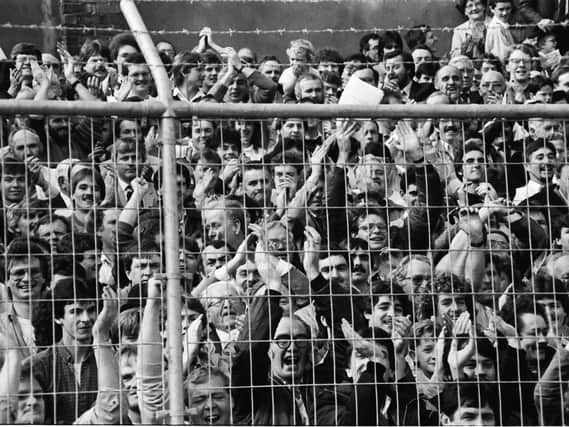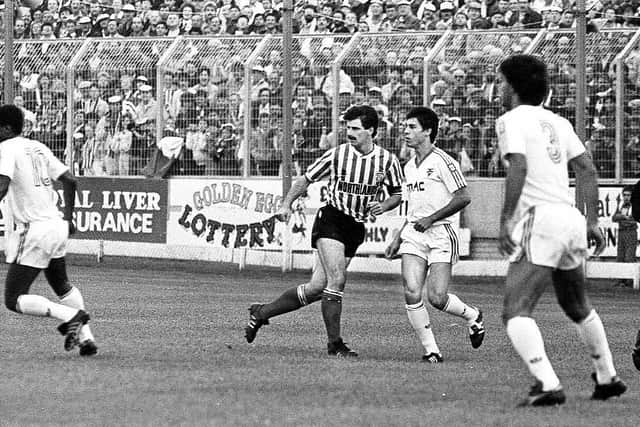Derry City story helped restore the true spirit of the people of the city


A true rags to riches story of Derry’s ‘Gang of Four’ and the rebirth of a football club, it documents the Brandywell club’s re-entry into senior football, its historic ‘treble’ success and culminates with the European Cup meeting with Portuguese giants, Benfica, during a colourful period in its rich history from 1985 to 1989.
It’s told against a backdrop of escalating violence during the ‘Troubles’ with the late Nobel Peace Prize Laureate John Hume claiming those halcyon years of the club: ‘restored the true spirit of the people of the city’ and its image after years of repression and depression.
Advertisement
Hide AdAdvertisement
Hide AdWatching 12,000 fans pack into Brandywell Stadium for its first League of Ireland fixture against Home Farm when grown men were reduced to tears, or the ‘tidal wave’ of buses carrying over 3,000 of the club’s Red and White army to Monaghan for the first away trip in 1985 was food for the soul and a wonderful trip down memory lane for many Derry fans of a certain vintage.
It’s a sight which now seems a distant memory, particularly during the Covid era, but those fans who watched last Friday’s 1-1 draw with Drogheda United from the newly claimed ‘Skint Hill’ on the wall at the Brandywell Road end shows the lengths Derry people will go to watch their beloved Candy Stripes.
Mr King’s documentary, which successfully captured how football can provide hope and entertainment for a city which was brought to its knees by violence and adversity, was a poignant and timely one.
Indeed, ‘A Different League: The Derry City Story’ arrived on our screens on Monday night following the recent announcement of the proposed formation of a European Super League, a move driven by greed and financial gains. That idea sits in stark contrast to Derry City’s unlikely renaissance of the late ‘80s, a dream driven simply by the love of the beautiful game; a dream borne out of a sense of injustice.
Advertisement
Hide AdAdvertisement
Hide AdWith the shadow of the ‘Troubles’ hanging ominously over the ‘Maiden’ city, Derry City fan and show contributor Eamon recalls the club’s first league match on September 8th 1985 as ‘a day the cloud lifted over the city’. Brandywell had become ‘a haven from all that was happening around it’, said political commentator Eamon McCann. Football was ‘a holiday from reality’.


The club represented the working class ideals of the city and provided a much needed release from the ongoing political unrest.
Derry’s ‘Gang of Four’, Tony O‘Doherty. Eddie Mahon, Eamonn McLaughin and Terry Harkin went to great lengths to ensure senior football returned to the city in 1985 and City fans owe them a huge debt of gratitude for their determination which was ultimately a harbinger for so many great memories for three generations of supporters.
The European Super League threatens to further tear apart the connection between those 12 major clubs involved and their supporters as the business of football and its ever widening expansion shows no signs of slowing.
Advertisement
Hide AdAdvertisement
Hide AdDerry City, however, remains very much in ‘a Different League’ and maintains that bond with its fanbase and community and this film shows how the game can inspire and galvanise a community rather than drive a wedge between fans and their teams.
“Look at our wee city. Ask anyone who grew up here, it’s the centre of the universe’, begins narrator Judith Roddy over the sound of ‘Danny Boy’ as the camera pans over Derry at the beginning of the show. ‘Even when things were bad we knew Derry was magic and one day we’d find a way to prove it,’ she continues.
“We started to believe there’s more to us than a petrol bomb,” explained Derry fan, Eugene McGeehan. “We could show people we’re not a downtrodden race any more.”
The footage of the burning of the Ballymena United bus signalled the demise of the football club in the early ‘70s as Derry City was swallowed up by the Troubles. Former goalkeeper Eddie
Advertisement
Hide AdAdvertisement
Hide AdMahon then takes up the story, explaining how he discussed with Terry Harkin over a sandwich the possibility of ‘going south’ in their bid to bring senior football back after 13 years of exile and annual rejection by the IFA.
Alongside ex-Northern Ireland international O’Doherty and former Sunderland and Derry player McLaughlin, and with the gate receipts of £4,000 from a friendly with champions Shamrock Rovers in tow, the Gang of Four made an impassioned speech to the FAI and media who were summoned to a plush reception in the Burlington Hotel in Dublin.
“It was a massive victory in every way,” recalled O’Doherty. “I’ve done a few things in my life but I will never do anything that I will be as proud of as that,” added an emotional Mahon. ‘I remember shouting and roaring like kids. We were like kids,” beamed McLaughlin. ‘I had a wee drink of lemonade, because I don’t drink,” laughed Harkin.
With membership of the League secured for the 1985/86 season, the documentary charts the formation of Derry City’s cosmopolitan side which included South African favourite Owen da Gama, Englishman Dennis Tueart, Brazilian Nelson Da Silva and Yugoslav striker Alex Krstic.
Advertisement
Hide AdAdvertisement
Hide AdIt touches on the frayed relationship between Noel King and Jim McLaughlin and the Dubliner’s resignation which paved the way for the club’s historic success that followed. There was one particular, emotionally charged scene showing what the club meant to Brandywell native, McLaughlin who claimed football was all he had growing up and it had been taken away from him as he faded into the background at Derry City, cut adrift by his fractious relationship with King.
Of course McLaughlin soon took control of team affairs and brought that missing ingredient - silverware.
Viewers were treated with some priceless footage as Derry City navigated its way to the Premier Division and then to the ‘Holy Grail’ of the domestic treble in the yet to be repeated 1988-89 campaign.
The visit of Sven-Göran Eriksson’s star-studded Benfica was almost overshadowed by the discovery of a bomb nearby which was dismantled or disposed of by the late Martin McGuinness who made sure the spotlight shone on Derry City FC for all the right reasons that memorable day.
Advertisement
Hide AdAdvertisement
Hide AdThe club meant so much to so many people - a notion captured beautifully by the Derry-born director.
The programme finishes off with a moving exchange with treble winning boss McLaughlin, who despite now living with dementia, recognises his former players when shown footage of the 1989 FAI Cup final win over Cork at Dalymount Park.
“That particular day was more than about football,” said Felix Healy. “It was about a community. A community that had been wronged and forgotten about. It was this community saying, ‘Look at us now’.”